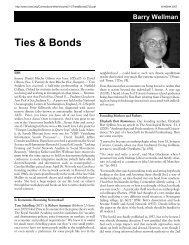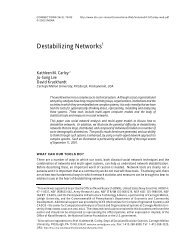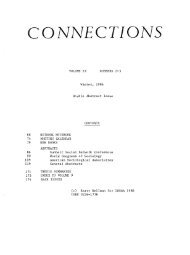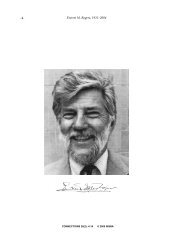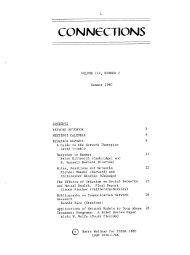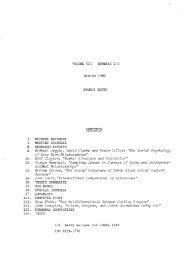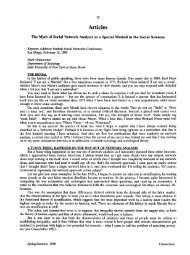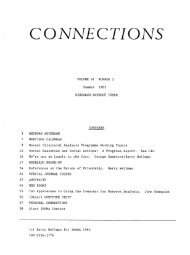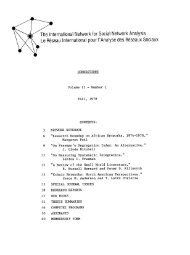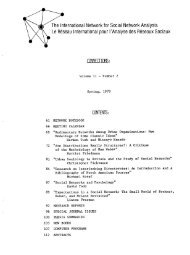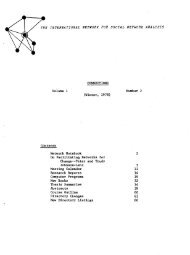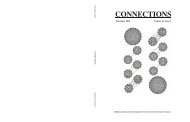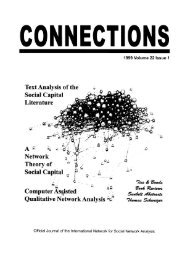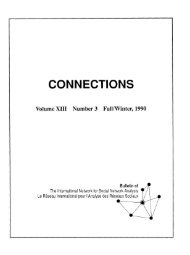Sunbelt XXXI International Network for Social Network ... - INSNA
Sunbelt XXXI International Network for Social Network ... - INSNA
Sunbelt XXXI International Network for Social Network ... - INSNA
Create successful ePaper yourself
Turn your PDF publications into a flip-book with our unique Google optimized e-Paper software.
Knowledge Sharing In Non‐knowledge Intensive Organizations: When <strong>Social</strong> <strong>Network</strong>s Do Not Matter?Koppius, Otto R.Organizational <strong>Network</strong>sKnowledge <strong>Network</strong>s, Intra‐organizational <strong>Network</strong>s, Knowledge Transfer, Non‐knowledge Intensive OrganizationsSAT.PM1Considerable attention has been paid to the network determinants of knowledge sharing. However, most, if not all, of the studies investigating thedeterminants of knowledge sharing are either focused on knowledge‐intensive organizations such as consultancy firms or R&D organizations, or knowledgeworkers in regular organizations, while lesser knowledge intensive organizations or non‐knowledge workers are rarely explored. This is a gap in the literatureon social networks and knowledge sharing. In this paper, the relations between network determinants and actor determinants of knowledge sharing areempirically tested by means of a network survey in a less knowledge intensive organization, specifically two separate stores of a Dutch department store chain.The results show that individual‐level variables such as organizational commitment, departmental commitment and enjoyment in helping others are the majordeterminants of individuals’ knowledge sharing behavior, but none of the social network variables play a role. The results thus present an important boundarycondition to social networks effects on knowledge sharing: social networks only seem to play a role in knowledge sharing <strong>for</strong> knowledge workers, not <strong>for</strong> bluecollarworkers.Leadership And Brokerage In Decision Simulation ExperimentsChristopoulos, DimitriosLeadership <strong>Network</strong>sLeadership, Evolution, Political <strong>Network</strong>s, Experiments, Decision‐making Structures, Simulation GameSAT.PM1Leadership roles are assumed determined by decisional power, most typically related to the hierarchical positions of agents. I examine here the conditionsunder which the position of agents in social structure affects their leadership reputation. Leadership behaviour is seen in this context to be the outcome of thecombined effect of the psychological predispositions of agents, their initial power endowment and their structural advantage versus other agents. There is anattempt here to combine leadership as agency with leaders as agents. A number of hypotheses are tested via an empirical case study where the evolution ofthe interaction and influence networks across multiple decision events is combined with attribute, reputational and psychometric data of the actors. Adecision simulation game provides a quasi‐experimental setting <strong>for</strong> exploring the effects of variegated distributions of power and their social networks on actoreffectiveness at coalition <strong>for</strong>mation, reputation and trust within the network. A number of the prominent brokerage assumptions (Burt, Lin) are comparativelyexplored in this context.



